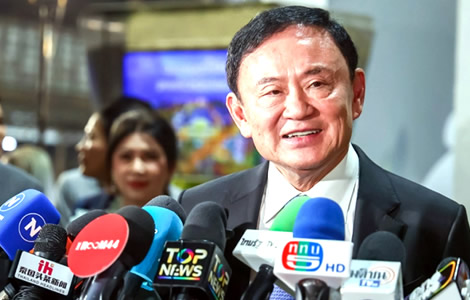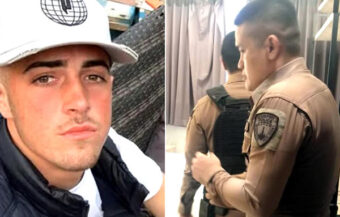Thaksin faces two crucial court dates—Aug 22 verdict in lèse-majesté case and Sept 9 ruling on prison sentence enforcement. These decisions will impact his freedom, legacy, and Thailand’s political future amid controversies over VIP treatment and national divisions.
The Criminal Court and Supreme Court for Political Office Holders have set fateful dates this month that will seal former Prime Minister Thaksin Shinawatra’s fate. On August 22nd, the Criminal Court will deliver a verdict in his lèse-majesté case, brought by the old junta. Then, on September 9th, the Supreme Court will decide whether to enforce his prison sentence from his August 22nd, 2023, return. These rulings could rock Thailand’s political foundation, shaping the future of one of its most powerful—and most divisive—figures.

Former Prime Minister Thaksin Shinawatra is entering a decisive phase in his long and controversial legal saga. Over the next several weeks, he will face two key court dates that may shape not only his immediate freedom but also his legacy in Thai politics.
The first case is scheduled for August 22, when the Bangkok Criminal Court will issue a verdict in a lèse-majesté case filed against Thaksin in 2015. The charge stems from remarks he made during an interview with a South Korean newspaper, in which he referred to Thailand’s 2014 military coup. According to the junta government that brought the charge, his comments violated Section 112 of the Thai Criminal Code.
This section, also known as the lèse-majesté law, punishes those who defame, insult, or threaten the monarchy. It is among the strictest royal defamation laws in the world. The penalty can reach 15 years in prison per offence.
Interview remarks from 2014 coup still haunt Thaksin as legal team claims charges are politically motivated
Although the interview took place years ago, the case has remained politically sensitive. Thaksin, who was then living in exile, has consistently denied any wrongdoing. He claims the interview was critical of the political situation, not the monarchy. His legal team argued that the charges were politically motivated and should be dismissed.
If acquitted, Thaksin reportedly intends to leave Thailand. According to close aides, he plans to travel to Singapore, possibly for medical reasons or to reunite with family. This would mark his first trip abroad since returning to Thailand in August 2023 after 15 years in self-imposed exile.
However, even if cleared in that case, Thaksin’s legal battles are far from over.
The second and more dramatic hearing is set for September 9. On that day, the Supreme Court’s Criminal Division for Holders of Political Positions will deliver its findings in an unusual sentence enforcement investigation. This inquiry could have major consequences for both Thaksin and the officials who handled his imprisonment.
The court is reviewing whether Thaksin was improperly spared regular prison time after his return. On August 22, 2023, he surrendered at Bangkok Remand Prison to serve an eight-year sentence stemming from previous corruption convictions. Yet, within hours, he was transferred to the Police General Hospital, where he remained for months.
He never spent a full day in a standard jail cell.
Royal pardon reduced Thaksin’s sentence but sparked outrage over alleged VIP treatment in hospital
The Royal Gazette later announced that Thaksin’s sentence had been commuted to one year by Royal Pardon, citing his past service and age. While such royal clemency is not unusual in Thailand, critics argued that the process lacked transparency. Many questioned whether Thaksin received preferential treatment unavailable to ordinary inmates.
Soon afterwards, photos of his hospital suite began circulating online. He was reportedly housed on the 14th floor in a special medical ward reserved for VIPs. The room was equipped with air conditioning, private nurses and security. Public outrage intensified.
Consequently, the Supreme Court launched its own inquiry on April 30, even after rejecting a petition filed by former Democrat MP Chanchai Issarasenarak, due to a lack of legal standing. The court cited “reasonable doubt” over whether Thaksin’s sentence had been properly enforced.
Since then, the court has held seven hearings, calling numerous witnesses. These included five prison doctors, hospital staff, prison guards, the Bangkok Remand Prison commander and senior Corrections Department officials.
Former Deputy PM Wissanu Krea-ngam testifies on hospital transfer citing security and medical concerns
Notably, the court also heard from Wissanu Krea-ngam, the former Deputy Prime Minister and Acting Justice Minister at the time of Thaksin’s return. Wissanu was brought in as a defence witness by Thaksin’s legal team.
Wissanu testified that he met Thaksin once at the hospital. He also held two high-level meetings with justice and police officials in preparation for Thaksin’s arrival. These meetings, he said, were aimed at ensuring security and medical readiness.
According to Wissanu, the reasons for Thaksin’s hospital transfer were threefold. First, he was a former head of government, requiring special protection. Second, prison officials feared threats from other inmates. Third, doctors deemed him unfit for incarceration in normal prison conditions.
He also addressed the Royal Pardon. Wissanu denied involvement in its drafting. He claimed he only co-signed the final command in an official capacity.
Nevertheless, the public has remained sceptical. Online discussions have questioned why Thaksin was moved so quickly. Others have asked why his hospital stay extended far longer than for comparable inmates.
Thaksin’s hospital stay draws unprecedented scrutiny despite precedents for other high-profile prisoners
Indeed, several past high-profile prisoners have been granted hospital stays. These include media mogul Sondhi Limthongkul and former Krung Thai Bank president Viroj Nualkaew. However, none of their cases triggered as much controversy or scrutiny as Thaksin’s.
As a result, the Supreme Court has ordered Thaksin to appear in person on September 9 at 10:00 a.m. He will be joined by the Corrections Department commander, who was also summoned—despite not being directly involved in the case.
That summons raised eyebrows in the legal community. Prominent lawyer Paisal Puechmongkol commented on Facebook that the decision was unusual. He noted that the commander is not a party to the case. Therefore, his presence may signal deeper institutional accountability.
Observers believe the court could use the case to send a message about fairness and impartiality in Thailand’s justice system. If the ruling finds wrongdoing, consequences could follow for top officials in the Corrections Department or even the Ministry of Justice.
Thaksin’s defence team maintains hospital stay was legally justified amid ongoing public scepticism
Meanwhile, Thaksin’s legal team, led by Winyat Chartmontree, continues to defend his treatment. They argue that all medical assessments were properly conducted. They insist that the hospital stay was legally justified and medically necessary.
Corrections Department spokespeople have echoed that view. In earlier statements, the agency said Thaksin’s condition required immediate care. However, critics point out that specific details of his illness have never been made public. That lack of transparency continues to fuel suspicion.
As Thailand watches closely, the stakes grow higher. The former PM is reportedly confident of his prospects in both cases. The outcome could influence not only Thaksin’s personal future, but also the public’s trust in the legal system.
If he is acquitted on August 22, Thaksin may travel abroad. He reportedly wants to visit Singapore. However, even that freedom may be short-lived. If the Supreme Court rules against him on September 9, he could face a new legal order—or a demand to return to prison.
Both verdicts carry political consequences in a polarised Thailand divided over Thaksin’s role amid ongoing crises
Both verdicts carry political consequences. Thaksin remains a polarising figure. For supporters, he is a victim of elite persecution.
Meanwhile, at a time when Thailand finds itself embroiled in crisis after crisis, with an economy mired in structural problems, he has the unique capacity to show leadership and vision. Nonetheless, for his longstanding critics, he is a symbol of corruption and entitlement at the root of problems and crises.
Ex-PM Thaksin’s lèse-majesté trial hearings close in Bangkok. Court sets August 22nd as Judgement Day
What happens in the next two months will certainly reverberate far beyond the courtroom. In a country where the judiciary plays a central role in political transitions, these rulings may well shape the direction of Thai politics.
Join the Thai News forum, follow Thai Examiner on Facebook here
Receive all our stories as they come out on Telegram here
Follow Thai Examiner here
Further reading:
Thaksin appears before Criminal Court in lèse-majesté case. Lawyer afterwards expresses optimism
Thaksin denied permission by the Criminal Court to leave Thailand before his August 19th hearing
Political maelstrom may be unleashed in June with potential crises brewing and coming to a climax


















